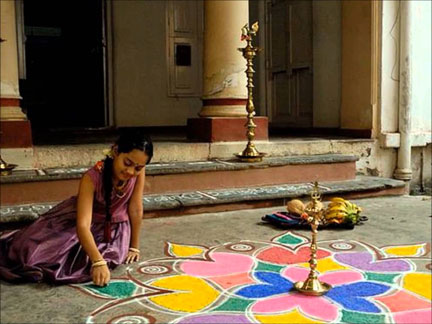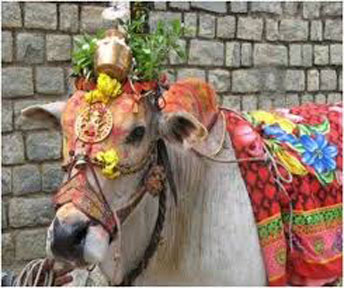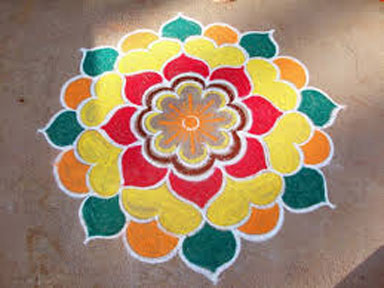Happy
Thai Pongal
Celebrating the bounties of mother nature with
offerings to the Sun God:
By P. Krishnaswamy
 The festive atmosphere, upto now redolent with holly and fur and all
things Christmassy, was cranked up with a uniquely sub-continental
flavour when the four-day Pongal harvest festival, more popularly known
as 'Thai Pongal', was celebrated in Sri Lanka, India and across the
world last week. The festive atmosphere, upto now redolent with holly and fur and all
things Christmassy, was cranked up with a uniquely sub-continental
flavour when the four-day Pongal harvest festival, more popularly known
as 'Thai Pongal', was celebrated in Sri Lanka, India and across the
world last week.
Called 'Thai Pongal' because the festival is observed in the first
four days in the month of 'Thai' in the Tamil-Hindu calendar, the main
festival, with offerings to the 'Sun God' was celebrated on Friday,
January 15.
A harvest festival traditionally celebrated by the farmers who depend
on mother earth, the sun, the rain, other natural elements, the cows and
the buffaloes for a bountiful harvest of their staple food, rice, it is
now one of the most important festivals celebrated by the Tamils across
the world. A great unifier, it sees the poor and the rich, the villager
and the city dweller, cast, class and rank forgotten, offering thanks to
the gods, and worshiping the sun, the earth, the cattle and their bounty
with devotion.
In Sri Lanka, Thai Pongal is celebrated in the North, the East and
the central hill country and in all areas where there is a concentration
of Tamil or Hindu families. The festival this time around is deemed very
significant to the people in the North and East, in that it is one year
since the UNF Government with President Maithripala Sirisena and PM
Ranil Wickremesinghe at the helm was established with their overwhelming
support, secured with the promise of a lasting and viable resolution to
the Tamil issue.
 |
|
The Legend
As with all traditions, there are several
legends associated with Pongal celebrations. Two of the most
popular legends are related to Lord Shiva and Lord Indra.
According to on legend, once Shiva asked
his bull, Basava, to go to the earth and ask the mortals to
have an oil massage and bath every day and to eat once a
month. Inadvertently, Basava announced that everyone should
eat daily and have an oil bath once a month.
This mistake enraged Shiva, who then
cursed Basava, banishing him to live on earth forever,
ploughing the fields and helping people produce more food.
Thus, the association of this day with cattle.
Another legend that concerns Lord Indra
and Lord Krishna, claim that when Lord Krishna was in his
childhood, he decided to teach a lesson to Lord Indra, who
became arrogant after becoming the king of all deities. Lord
Krishna asked all the cowherds to stop worshiping Lord Indra.
This angered Lord Indra, who sent forth his clouds for
thunder-storms and three days of continuous rains.
Lord Krishna lifted Mount Govardhan to
save all the humans. According to Hindu mythology, this is
when the day of the gods begins, after a six-month long
night. The festival is spread over three days and is the
most important and most fervently-celebrated harvest
festival of South India.
A special pooja is performed on the first
day of Pongal before the cutting of the paddy. Farmers
worship the sun and the earth by anointing their ploughs and
sickles with sandal wood paste. It is with these consecrated
tools that the newly-harvested rice is cut. The origins of
the Thai Pongal festival may date to more than 1000 years
ago. Epigraphic evidence suggests the celebration of 'Puthiyeedu'
during Medieval Chola empire days. Puthiyeedu is believed to
represent the first harvest of the year. |
|
 |
The past year has seen a lot of positive changes in the North and
East, giving the Tamils a renewed sense of confidence, and a spring to
their step as the townships bustle with life. It is in such an
environment of hope and optimism, Thai Pongal is being celebrated this
year.
New replacing the old
On the festival days, the houses are cleaned, painted and decorated.
People wear new clothes and cattle are gaily caparisoned with beads,
bells and flowers and their horns painted and capped with gleaming
metals. There, as a tradition, the first day of Pongal is marked by
feasting and merry-making, with the new replacing the old, including old
worries.
Huge bonfires are lit and everything that unwanted around the house
is consigned to the flames. In the olden days all old clay utensils were
ritually broken and potters were asked to supply a fresh stock. With the
advent of plastic and steel, sadly this ritual only has a symbolic
relevance today.
Pongal is the only festival of the Tamil that follows a solar
calendar and is celebrated in mid January. Pongal also has astronomical
significance as it marks the beginning of Uttarayana, the Sun's movement
northward for a six-month period.
In Hinduism, Uttarayana is considered auspicious, as opposed to
Dakshinaayana, or the southern movement of the sun. All important events
are scheduled during this period. Makara Sankuranthi refers to the event
of the Sun entering the zodiac sign of Makara or Capricorn. House to
house bajan processions are held beginning from the lean hours of the
morning and special 'Margazhy' and 'Thiruvembavai' poojas are performed
in temples in the month of 'Margazhy', the cold month preceding 'Thai'.
Colourful Kolam
Throughout the month, the front yard and entrance of every Tamil
house is decorated with the 'Kolam' in colourful designs. Symbolising
happiness and prosperity, Kolam, a form of drawing using coloured rice
flour/chalk/chalk powder, is more than just an aesthetic artwork.
Insects and birds feed on the rice flour, which is often used for the
drawings in Sri Lanka, reflecting the inclusivity of man and nature and
the former's concern for all living creatures.
The month of 'Thai' is a very auspicious period to begin new ventures
after the gloomy period of 'Margazhy'. There is a Tamil saying 'Thai
Poranthal Vazhy Porakkum', meaning that with the dawn of the month, a
path for prosperity and happiness will be paved.
Pongal signals the end of the traditional farming season, giving
farmers a break from their routine back breaking work. Thankful to the
bounty provided by mother earth, they perform pooja to the crops
bringing the traditional farming season to a close and setting in motion
the series of festivals to follow in a calendar year. Pongal is the day
when the pot of milk and rice must boil over to be deemed auspicious. On
Pongal day, long before sunrise, the women of the house draw intricate
patterns of kolam outside their doors. Within the perimeters of kolam,
typically, firewood is used to cook the rice. This is the called the 'Surya
Pongal', meaning the Pongal for the Sun God.
In
Sri Lanka, only this and the following day's 'Mattu Pongal' or Pongal
for the cattle are celebrated, with the Pongal set up in the direct view
of the Sun (East).
The pealing of bells in Hindu temples, drums, clarinets and conch
shells herald the joyous occasion of Pongal. To symbolise a bountiful
harvest, rice is cooked in new pots until they boil over. Some of the
rituals performed in the temple include the preparation of rice, the
chanting of prayers and the offering of vegetables, sugar cane and
spices to the gods. Devotees then consume the offerings to exonerate
themselves of past sins.
Pongalo Pongal
The ritual of cooking of rice and milk is done in the open in the
fields by farmers and in the court yards and lawns of homes in the
cities and villages, at a pre-determined auspicious hour.
The cooking area is decorated with flowers, sugar canes, plantain
trees, buntings of flower garlands and rice paste. Even the cooking pots
are decorated, their necks with freshly harvested turmeric or mango
leaves.
The boiling over of the contents is the auspicious sign the family
waits for. And the women folk make a strange sound special to this
occasion, intoning "Pongalo, Pongal" in high pitched voices. This is an
offering to the Sun God and Mother Earth.
The cooked preparation also called Pongal (made of new rice, milk and
newly made jaggery) is offered to the gods along with preparations of
vegetables and lentils, newly harvested sugar cane and bananas. Later
the family sits down to a ritual meal. Besides rice and milk, the
ingredients of the 'Pongal' sweet dish include cardamom, jaggery,
raisins, green gram (split) and cashew nuts. Cooking is done in
sunlight, usually in a porch or courtyard, as the dish is dedicated to
the Sun God, Surya. The cooking utensil is clay pot decorated with Kolam.
Pongal
has two variants, one sweet and one savoury. Both pongals are served on
banana leaves.
The second day of festival is called 'Mattu Pongal' and is dedicated
to the cattle, which has and continues to play an important role in
farming. 'Mattu Pongal' is celebrated as a day when the cattle are
worshipped and treated like kings. They bathed their horns painted in
bright hues, fed on the best of feeds and taken to the village centre
where the devotees offer flower garlands and other offerings.
A festival called 'Jalli Kattu,' or bull fighting, is held in many
places in Tamil Nadu. A type of taming or controlling the savage bull
for a reward for heroism, the sport is popular among the young men.
Bundles of cash are tied to the horns of ferocious Pongal bulls. The aim
is for the villagers to retrieve the money from the bulls.
Everyone joins in the community meal, which comprises mainly dishes
made of the freshly harvested grain. |

